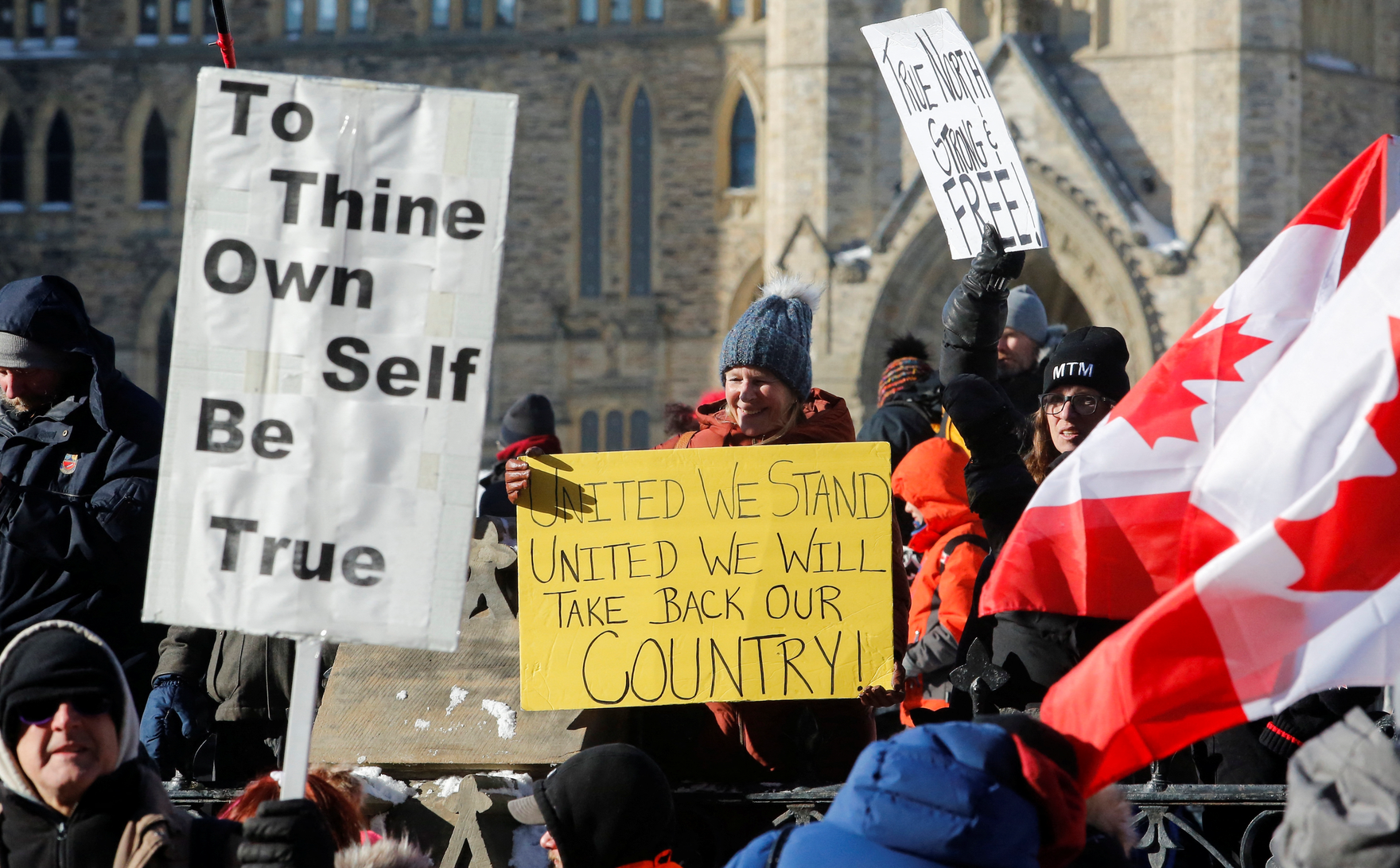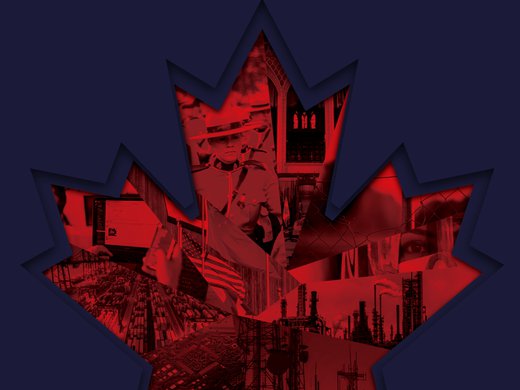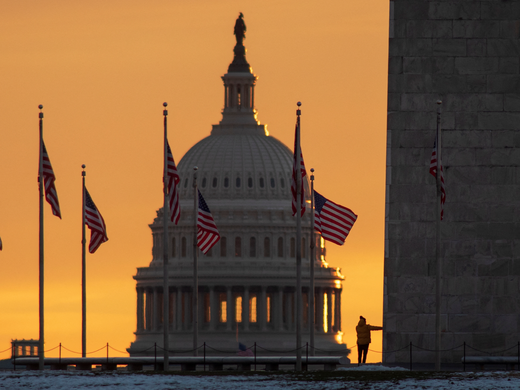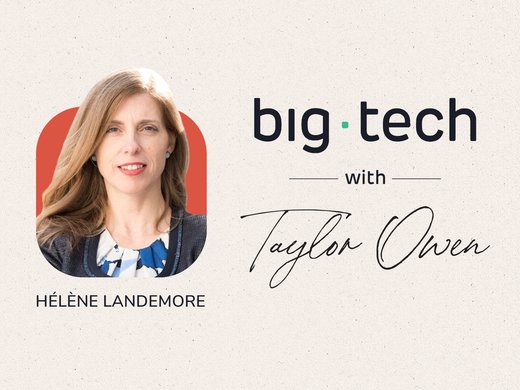The so-called Freedom Convoy protest that descended on Ottawa has entered a second, terrible week. For days, the blaring of horns from the transport trucks that flooded, unimpeded, into the streets around Parliament Hill could be heard from kilometres away. Ottawa’s downtown core has been rendered unlivable for its residents, one of whom, prominent civil rights lawyer Paul Champ, has fought back with a class-action lawsuit against the protesters.
Some protesters have carried swastika and Confederate flags — virulent symbols of anti-Semitism and racism. One of the convoy organizers, Benjamin Dichter, laughably described the presence of swastikas as a “false-flag” provocation operation conducted by the federal government. American flags are in evidence to symbolize the idea that the Ottawa occupation follows in the bloody footsteps of the January 6 Capitol Hill riot. Among innumerable despicable acts has been the desecration of the National War Memorial just outside the grounds of Parliament Hill.
With Ottawa’s downtown under occupation, Parliament must try to function amid the chaos. Supreme Court justices must find ways to sneak in and out of the Supreme Court building on Wellington Street.
The City of Ottawa has now declared a state of emergency, but that will change little. Neither will a belated effort at soft policing in the form of ticketing. The Ottawa Police Service suffered a terrible failure of intelligence about the threat the convoy presented. Its chief, Peter Sloly, has deepened that failure by publicly acknowledging the force’s inability to cope with the situation. This white flag has only emboldened the occupiers, who, in their magical and deluded thinking, believe they are on the cusp of some kind of insurrectionist victory.
The occupation will fail, but its denouement has yet to be written and, sadly, may not be entirely peaceful, owing to enforcement failures in the initial stages. Prime Minister Justin Trudeau may ultimately have to summon the ghost of his father — who, when asked what he intended to do in the face of the FLQ crisis in 1970, famously said, “Just watch me,” declaring an apprehended insurrection, then sending the military into the streets of Montreal.
Signs claiming the occupiers are on the right side of history will be banished to the wrong side. The sooner this happens, the better. When the smoke clears, we will see the occupation for what it is — an assault on democracy and on our collective rights.
We take our democracy for granted — but look around. Democracy is under threat around the world from authoritarian nationalist and populist movements that have installed strongmen as leaders. Democracy is derided by regimes, such as Russia and China, that deny democratic values and believe the societies and economies that embrace them are weak and divided. Democracy is likewise under threat in our closest neighbour and long-time security partner, the United States. Canada is not a democratic island insulated from these global trends.
Canada prides itself on being a steadfast supporter of a rules-based order in international relations. The country’s global reputation is now tarnished by the Ottawa mob and by an evident unwillingness to apply basic standards of good governance to domestic law enforcement in the nation’s capital. Online propaganda, social media disinformation campaigns and fundraising websites ranging far beyond our borders have transformed the Ottawa occupation into an international affair, with a motley assortment of US Republican politicians and far-right and white supremacist figures jumping on the digital anti-vax bandwagon.
The terrible message of the Freedom Convoy is that Canadian democracy will increasingly need defending both on the ground and in the digital domain. This will require a willingness to rethink law enforcement, including the federal policing role of the RCMP; the readiness of the military to aid the civil power; and the sufficiency of our legal code, including with regard to online hate, incitement and foreign fundraising. It will require a new cultural project for Canada to mark our distinctiveness as a democratic society and to distance ourselves from anti-democratic trends in the world within and beyond our borders. Foreign interference in our democratic process, even or especially when it involves Americans, must be denounced.
We can start by rethinking our approach to the definition and protection of the infrastructure critical to civil society. When protests subvert the functioning of such infrastructure, they become anti-democratic. It is high time to make that clear in our federal legislation and in our enforcement practices. The Freedom Convoy is encamped on critical infrastructure, steps from the Office of the Prime Minister, and interfering with peoples’ freedoms — it has no business there. Once the rigs are gone, barriers of concrete and steel must be installed to ensure they can’t return. We must never again be so unprepared.
Politically motivated legislation on critical infrastructure was enacted in Alberta to try to stamp out pipeline protests in early 2020. That can’t be the model. But, as a democracy, we require a shared definition of critical infrastructure: the essential services that Canadians need to live their lives, with peace, order and good government. Such infrastructure can be a legitimate target of peaceful protest. But it must not be interfered with.
In last fall’s election campaign, the Liberals promised to introduce legislation to safeguard Canada’s critical infrastructure. The Conservatives promised to pass a critical-infrastructure protection act. Both parties were thinking narrowly and talking past each other — the Liberals about telecommunications and 5G, and the Conservatives about pipelines.
That was then. The Ottawa protest now tells us we need to think more broadly — and act.
This article first appeared on TVO.org.



